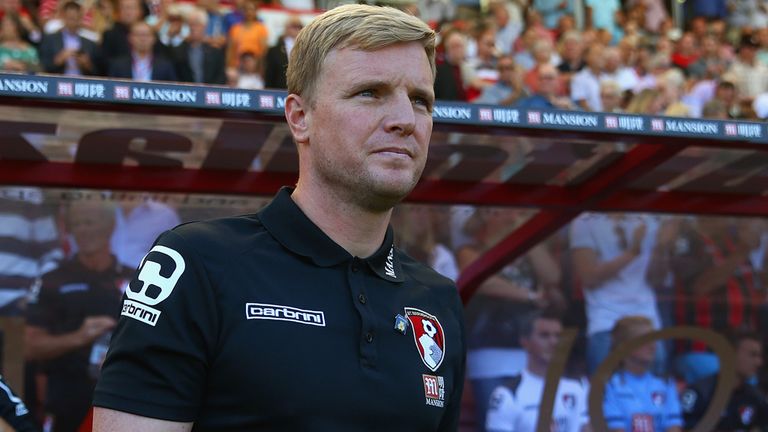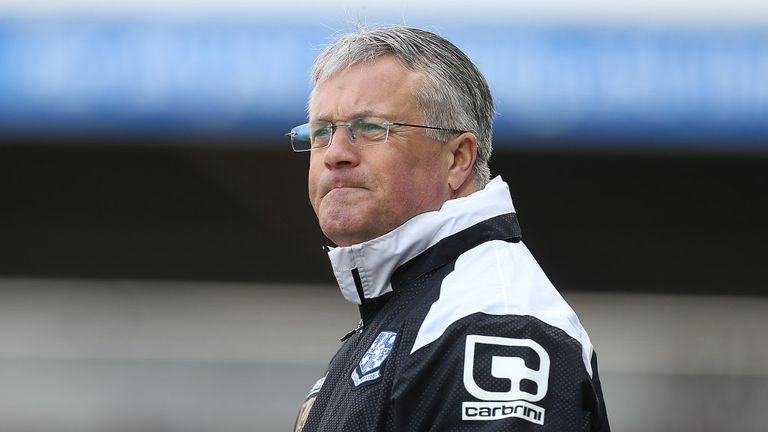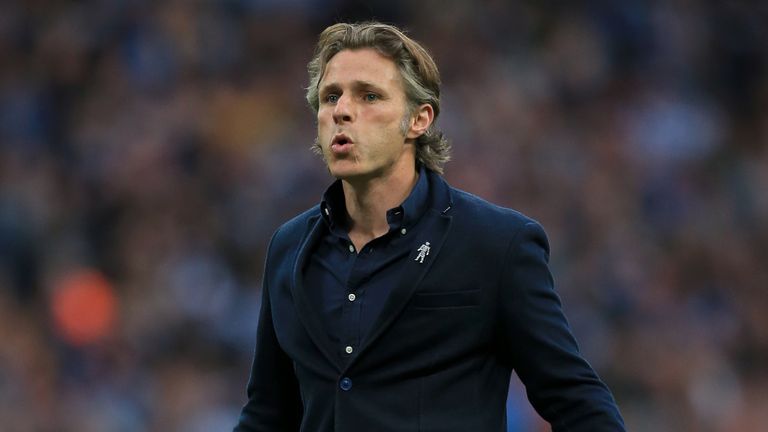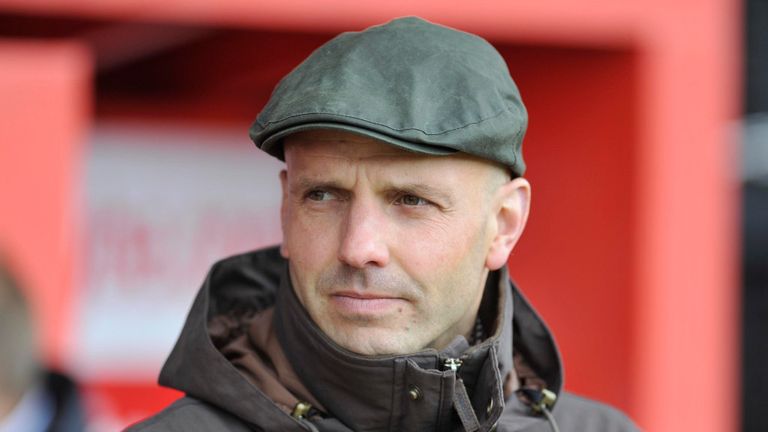Living on the Volcano: The real story behind football management

Saturday 22 August 2015 09:08, UK
Living on the Volcano author Michael Calvin on the truth about football management.
"We all suffer." It didn't take long for Arsene Wenger to get another reminder of why his verdict on football management, expressed in the fascinating new book Living on the Volcano, remains as true as ever. Arsenal's 2-0 defeat to West Ham on the opening day of their season brought familiar questions for English football's longest-serving boss.
The similarities between Wenger and, say, Gareth Ainsworth might not be obvious. But whether it's Mark Hughes, Paul Tisdale, Brendan Rodgers or Joe Dunne, everyone has to endure the lows. In Living on the Volcano, Michael Calvin explores their methods and their motivations. Adam Bate caught up with him to discuss what he learned…
There's more to managers…
What I wanted to do was humanise what is pretty much a dehumanising job. It's interesting that there were a couple of the club media guys who asked to sit in on the interview. They went away saying how much they learned from the manager they'd been working with for a couple of years. It's quite strange really.
Trending
- Amorim: Man Utd are maybe in one of their lowest moments
- Transfer Centre LIVE! Bayern want Dortmund's English winger Gittens
- Man Utd latest: Dalot spends Christmas Eve helping homeless
- How does a 'different' Arsenal cope without Saka?
- World Darts Championship schedule: Who is playing when after Christmas?
- Is this the man to dethrone Usyk? 'He would knock him out!'
- PL Predictions: Forest to turn up heat on stubborn Ange
- Liverpool latest: Gakpo hopeful 'very special' Salah will agree new deal
- Maresca content for Mudryk to 'disconnect' after provisional suspension
- Goals, tackles, catches - the best of Sky Sports video in 2024!
The great thing about doing books as opposed to the day-to-day stuff is that it confers a certain immortality to the subject. The managers themselves were willing to open up in a deeply emotional way. A lot of them said they liked it because they were getting asked the type of questions they don't get asked at the typical news conference.
It was interesting that the word got around the community - because it's so close - that this is what I wanted to do. The guys themselves got what I was on about. The name of the game is that judgement is instant but people are making those judgements without knowing them as people. They raised this point a lot.
They feel it as much as anyone…
Arsene doesn't just feel for Arsenal, he probably is Arsenal. With Eddie Howe, you could tell with the way that he was talking about Bournemouth and how they were going to get kicked out of the training ground with bailiffs coming round, just how much he felt for the club. Eddie's view is that this is about making an impact on people's lives.
There is no choice but to be positive…
Karl Robinson, who I found really interesting as someone who embodies the younger breed of manager, talked about how there is a side to managers that we are never allowed to see. That's why people don't understand the strength of feeling. He said that they cannot be perceived as being weak. That was a common theme.
Eddie said that as a manager you cannot be down all week because players are looking to you for strength. There's that need to play the role. They live their lives under such relentless scrutiny that those lives do become almost a lie in themselves. That's not a malicious thing. They're conditioned to accentuate the positives at all costs and at all times.
For some, it seems like an addiction…
The strain under which they work is quite intense and they've got this ability to compartmentalise their lives. Micky Adams is a really good case study because he'd left Port Vale, went away for two weeks and became a human being again, going to his brother-in-law's in the Dordogne to pick the harvest.
Then he decided he was ready again and went back. Within another week he was at Tranmere. I found him sitting in an empty office overlooking a car park at Prenton Park with one motivational poster on the wall and a cheese and onion sandwich.
What do players want from a manager?
Micky talked about how the players were almost giving him puppy eyes. Help me. That's the thing I found really interesting – how managers talked about what was expected of them, not by the media or the fans but from the players. It does almost come down to the basics.
Mark Hughes summed it up well by saying that you've got two or three days to make an impression on a new dressing room. He had a reputation as a player but after a while you've got to stand up in front of them and answer that question everyone wants to know but nobody ever asks: 'What are you going to do for me then?' It's all about that.
'How are you going to make me a better player so I can get that new contract or move to that bigger club?' When you're in a dressing room, you see that ambition. People can try to articulate that in interviews or press conferences but it's a bit superficial. When you can see it in people's eyes, you can sense it when a dressing room isn't having a manager.
Coach, manager and father figure…
Gareth Ainsworth, who incidentally is a terrific man, is a very modern and empathetic manager and he told me that it took him a long time to realise that he is the most important person in these people's lives. Some of the players in his squad had no families, no dads, they come from broken homes and they just need an arm around them.
He told me there was one player who there's no need to name who had been through a lot in his life. If you saw him now he'd be the one who's cocky, with his shoulders back and seeming arrogant. But Gareth knew what this kid wanted. He wanted to impress someone in his life and make someone proud of him. His job as a manager was to meet that need.
It's more than a results business…
They are the key people in terms of running a football club effectively. And yet, they are instantly disposable. The phrase I used was Poundland profits – they're in there one minute and gone the next. It's the basic weakness of the managerial system that they haven't got long enough to implement a strategy and truly live the philosophy they espouse.
In essence, managers are long-term people in a short-term business. Someone like Paul Tisdale at Exeter is fascinating. Culturally, he's got more in common with people in cricket. That's his love. So he's always been that cultural oddity. But he understands the importance of every aspect of that football club. There are the details that I don't think people realise.
For example, there was a kid there called Matt Grimes. To keep a club like Exeter going so it can move forwards, Paul went through a process whereby for the first 15 games of last season he engineered his team to provide the best possible platform for Matt to impress so that he could get sold. He was a turkey dressed for Christmas.
He played two veteran midfield players in the centre of defence so that the supply lines to him in midfield would be better. He made sure that the pitch was in good condition early in the season because he was a good ball player. It worked. They got the money. Here was a guy who knew his club. They've now invested those funds in the training facilities.
We hear a lot about how the job is to develop football players to be sold but that's just one line. You've got to read between that line and see how an intelligent manager who knows his club can understand where they are in the food chain and almost engineer a situation where they can sell their best player. I found that really interesting.
Getting behind the façade…
I really liked Brendan Rodgers. I suppose he's conditioned to talking in little soundbites. It's coach-speak. The one-line philosophy about being a welfare officer. He talks about 'our people' and the Shanklyesque stuff but what I found most authentic about Brendan was when I asked him to talk to me as if he wanted to sign me as a player and he got that.
We went to the flip chart in his office and he gave me the pep talk. What I found really interesting about Brendan is that he's got far more emotional depth than his critics would want to acknowledge. When you get Brendan away from 'the circus' and instead talking in human terms about how he does his job and why he does is job, I found that interesting.
I think Alan Pardew wanted to talk about that, too. I found it really gratifying because we did that interview at a time when all the media were banned from the training ground. When we sat down in the office, he got what I wanted which was 'Who are you?' What these guys did was put football into a context.
He talked about his upbringing on the building sites, which is, I think, fundamental to how he does his job. His father was an authority figure and that was a common theme among the managers – they still wanted to impress their father or their mother. And there is an element of these managers being father figures.
That sophistication of ambition is the thing. They're not just producing a player but a person and that's completely counter-intuitive to everything we're told about football which is that they don't give a stuff about anything but winning a game. It can't be that black and white. Football is shades of grey. But there is that threat of failure in terms of getting sacked.
The frustration of seeing managers lose their job…
There were 62 managerial changes last season with 47 of them sacked. The strangeness of the whole process is that one of the most impressive guys that I met was called Joe Dunne. I wanted to speak to Joe because I knew absolutely nothing about him. He'd been manager of Colchester for almost two years and I just didn't know him.
It was real world stuff at Colchester. When he first got there they were playing on the park where the junkies were, picking up syringes and so on. Then they moved to the garrison where 3 PARA were sending kids to Afghanistan. He was emotionally intelligent enough to realise how almost unseemly that was.
I found him one of the most impressive characters in the book and his philosophy was fantastic. We spent about five hours talking one afternoon and he was sacked about 10 days later. I mention Joe because if there is a chairman who reads this book I hope they'll get his CV and think 'I'm going to speak to this guy' because I find it incredible he's not got back in (NB: Dunne is now assistant manager at Cambridge United).
Hopes for the book…
People say they are well paid. But the fact that they are high profile doesn't give us the right to intrude on their family lives, for me. A lot of the managers talk about going under the radar for 24 hours after a game. Karl Robinson talks about going for a walk around the local lake with his daughter and having a guy jump in his path. I just think that's untenable.
So hopefully some people will read this and think, 'When I see him in front of a camera coming up with a line for Sky Sports News, I'll think of him as a person'. If by reading this book, one person will not hit 'send' when they've got 140 characters of bile then the book is worthwhile.
Living on the Volcano: The Secrets of Surviving as a Football Manager, by Michael Calvin











